I wasn’t allowed to watch Toy Story 2 when I was 21 years old because the trailer depicted a group of Barbies in bikinis led by Tour Guide Barbie. So when I found out some influential conservatives were having a conniption fit over the Warner Bros new Barbie movie, I had to see for myself what the patriarchy was so riled up about.
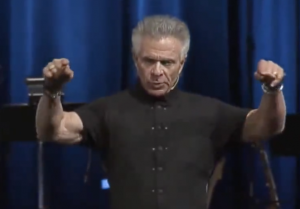
Kent Christmas
“And I curse in the name of the Lord this new Barbie movie that has been released full of transexual and transgender and homosexuality in the name of the Lord,” declared Regeneration Nashville pastor Kent Christmas. “May God loose a holy judgment. Hallelujah! Go ahead and write in all that you want. What’s happened is the church has been so intimidated and so silent that we’re afraid to stand up and declare, ‘Thus saith the Lord!’”
In a scene reminiscent of Toy Story’s violent neighbor Sid, conservative political commentator Ben Shapiro threw Barbie toys into a trash can, lit them on fire, and showed them melting to screaming sounds to kick off his 43-minute review. He called Barbie “not just a piece of s**t. This movie is a flaming piece of dog s**t piled atop an entire dumpster on fire piled atop a landfill filled with dog s**t.” Then he predicted, “It’s just going to die in China. … Good luck with the Chinese communist government putting their kids in front of this sort of stuff.” His final rating? “Negative all the Barbies! Negative all of them! … Negative infinity Barbies … This is Barbie head atop the robot body made by the weird kid from Toy Story 1.”

Ben Shapiro
Focus on the Family’s PluggedIn movie review site warns that Barbie shows women wearing “swimsuits and other outfits that bare some skin (including cleavage)” and that “many Kens like to walk around sans shirt.” They also warn that “some Barbies and Kens are portrayed by members of the LGBT community, and this occasionally comes through in their portrayals.” Regarding one scene where two men are laughing on a park bench, PluggedIn warns, “We see a same-sex couple flirting in the real world.” Among the many negative elements, they list “a plastic Barbie dog” that “‘poops’ plastic turds.” So they recommend parents accompany their teens in order to protect them from indoctrination.
Movieguide warned, “Don’t Take Your Daughter to Barbie.” They claimed Barbie is “pushing transgender character stories” and paired the Warner Bros. production with Pixar and Disney who “recently suffered severe losses with Elemental, which also promoted LGBT characters.”
But the public isn’t buying what these conservative influencers are selling. Greta Gerwig’s film broke the box office record for opening weekends in 2023 and broke the record for opening weekend for any film directed by a woman.
“It’s about exposing the absurdity of patriarchy and discovering what it means to be human.”
While many are claiming Barbie is about promoting gay people, the reality is that it’s about exposing the absurdity of patriarchy and discovering what it means to be human.
Warning: Major spoilers ahead.
Women in boxes
Barbie opens with a group of young girls playing with baby dolls, pointing to how they are being formed to play at being mothers. When conservatives decry this opening scene as indoctrination against motherhood, they’re revealing their own lack of self-awareness of how far-reaching patriarchy has permeated our society and boxed women in. And lest they say Gerwig is on a campaign against motherhood, later the film lists motherhood as a legitimate and good pursuit women can choose.
But then Barbie is released.

Greta Gerwig (center) with cast members of Barbie.
“She has her own money, her own house, her own car, her own career,” the narrator describes. “Because Barbie can be anything, women can be anything. And this has been reflected back onto the little girls of today in the real world. Girls can grow into women who can achieve everything and anything they set their mind to.”
Megachurch pastor Mark Driscoll, who has been exposed for misogyny and spiritual abuse, announced to his email subscribers on Tuesday that he is “rereleasing almost 1,500 pieces of content from the vault on YouTube.”
In one of his first rereleased videos, he begins by almost gagging while reading a question about whether men can be stay-at-home dads. Grace Driscoll, his wife, begins by saying you can’t respect men who are stay-at-home dads. “We’re built, as women, we’re built to be home with our kids and the Titus 2 woman, we’re supposed to be loving our husband and children, busy at home, homeward focused, pure, kind, self-controlled, so that we don’t malign the word of God.”
Mark Driscoll then says stay-at-home dads are worse than unbelievers, are acting like Peter Pan, are boys who can shave, are not men, and should be disciplined out of the church. He adds that stay-at-home dads aren’t mentioned in the Bible. Never mind that there are many things never mentioned in the Bible.
While many conservatives in the pews today would disagree with Driscoll’s condemnation of stay-at-home dads, their complementarian theology of gender roles creates the world that boxes women in and empowers Driscoll’s rant.
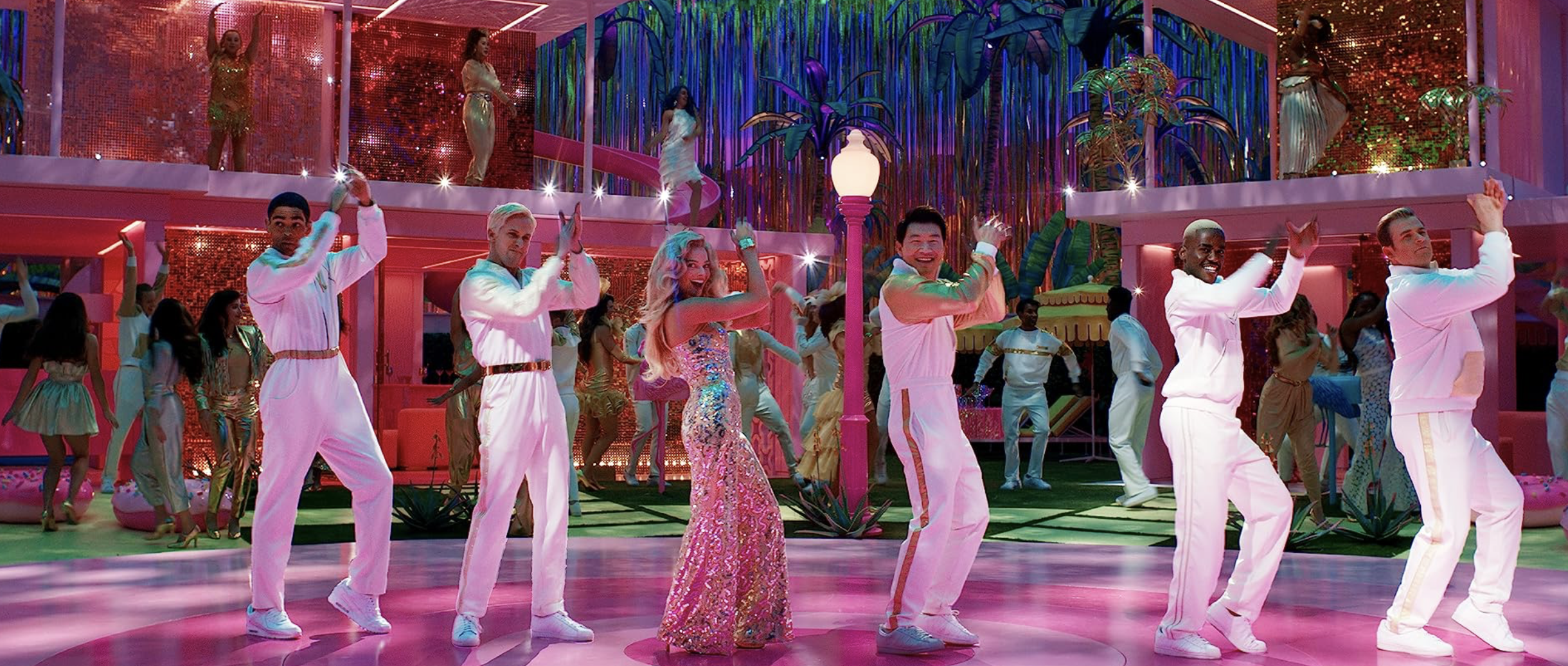
An expanding reality inextricably intertwined
Barbie’s opening monologue closes with a moment of obvious sarcasm. The narrator jokes, “Thanks to Barbie, all problems of feminism and equal rights have been solved. At least that’s what the Barbies think.”
The film reveals a parallel between Barbieland and the real world so that how a child plays with their Barbie in the real world affects how the Barbies feel and experience life in Barbieland. It’s a vision of reality where two seemingly different worlds are “inextricably intertwined.”
Gerwig’s intertwined vision of reality is similar to the web of relationality spoken of in quantum physics and liberation theologies.
In his latest book, Curveball: When Your Faith Takes Turns You Never Saw Coming, biblical scholar Pete Enns explains: “A central concept in evolutionary biology, cosmology and quantum physics is ‘relationality.’ … At its core, existence is not individual things occupying space, but things existing in relation to each other.”
The entanglement of quantum reality has led philosophers to speak of the universe as “monistic,” or as a unified whole. Scientists have referred to the “non-separability” of reality.

Rasmus Jaksland, a science and philosophy fellow at the University of Copenhagen, says, “Adopting entanglement as the world making relation comes at the price of giving up separability.”
In liberation theologies, C.S Song illustrates how Chinese paintings reveal that “we are in nature and nature is in us, and together we and nature are in God” in a “world of multiplicities … all stamped with the One.”
Mary Potter Engle and Susan Brooks Thistlethwaite talk about the web of relationality between subjects and objects through the lens of a “praxis-based theology” that is “characterized by an ongoing, dynamic and complex relationship between the concrete social context and theological reflection.”
Or as Jesus put it, we love our neighbors as we love ourselves.
In the web of relationality between Barbieland and the real world, Barbie is told she has to help the child who is playing with her in the real world in order to help herself. By naming and feeling through our own wounds, we can begin to recognize how inextricably intertwined they are with the wounds of others. And in this oneness, just like the universe, dualities dissolve and consciousness expands.
One Barbie said it this way: “I have no difficulty holding both logic and feeling at the same time. And it does not diminish my powers. It expands them.”
But as Young-chan Ro proposes, this theological reflection of universal relationship must be considered within the narratives of our different experiences.
The contrast of male and female experiences
As Barbie and Ken venture into the real world, their different experiences are on full display. While Barbie feels “ill at ease” due to the way men are looking at her, gesturing toward her or calling out to her, Ken says, “I’m not getting any of that. I feel like what could only be described as admired, but not ogled. And there’s no undertone of violence.”
Barbie responds, “Mine very much has an undertone of violence.”
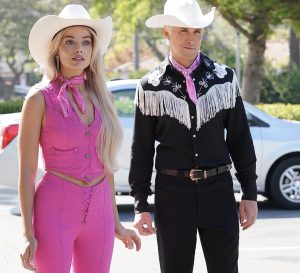 In the worlds of Christian theology, these different experiences affect not only our experience of reality, but the way we read the Bible.
In the worlds of Christian theology, these different experiences affect not only our experience of reality, but the way we read the Bible.
While men like John MacArthur may point to the violent language of slavery dynamics in the Bible as a good thing, womanist theologians like Wil Gafney experience these dynamics quite differently. She writes: “We have been taught to say God is king, but kings in the ancient world were warlords who secured their thrones with the broken and battered bodies of their enemies, often killing their wives and children. We have been taught to say God is Lord and Master but those are slaveholding terms. And slaves in the ancient world as in our own ancestry were used like beasts of burden, maimed, raped, sold and killed with neither thought nor consequence. Even when lord becomes a title of nobility it still rests on the notion of some human beings lorded over others. We have been taught to say God is husband, but it is in the role of husband that the prophets who proclaim liberation also proclaim words of violence rooted in violence against women and call it the word of God.”
Violence against women has been so normalized among patriarchal men that R.C. Sproul described salvation as rape. “You will resist it as hard as you can, but God will overcome your resistance,” he preached. “(Jonathan) Edwards called it ‘the holy rape of the soul.’ Some people are violently offended by that language. I think it’s the most graphic and descriptive term I can think of for how I was redeemed.”
Patriarchy and male hierarchical power over women
Ken’s experience with patriarchy in the real world gives him a taste for what he could accomplish in Barbieland. He visits the library to look for books about trucks. He exclaims, “Why didn’t Barbie tell me about patriarchy, which to my understanding is where men in horses run everything?” Later, he mentions that “horses are just men extenders” and observes that “everything, basically everything exists to expand and elevate the presence of men.” His favorite song is “I wanna push you around.”
Of course, conservatives will complain this is clearly exaggerated. But the most influential leaders of complementarianism promote these very dynamics.
In one moment, Ken celebrates, “You respect me” to a woman because she asks him the time. It sounds just like John Piper imagining: “A housewife in her backyard may be asked by a man how to get to the freeway. At that point she is giving a kind of leadership. She has superior knowledge that the man needs, and he submits himself to her guidance. But we all know that there is a way for that housewife to direct the man in which neither of them feels their mature femininity or masculinity compromised. To the degree that a woman’s influence over man is personal and directive it will generally offend a man’s good, God-given sense of responsibility and leadership, and thus controvert God’s created order.”
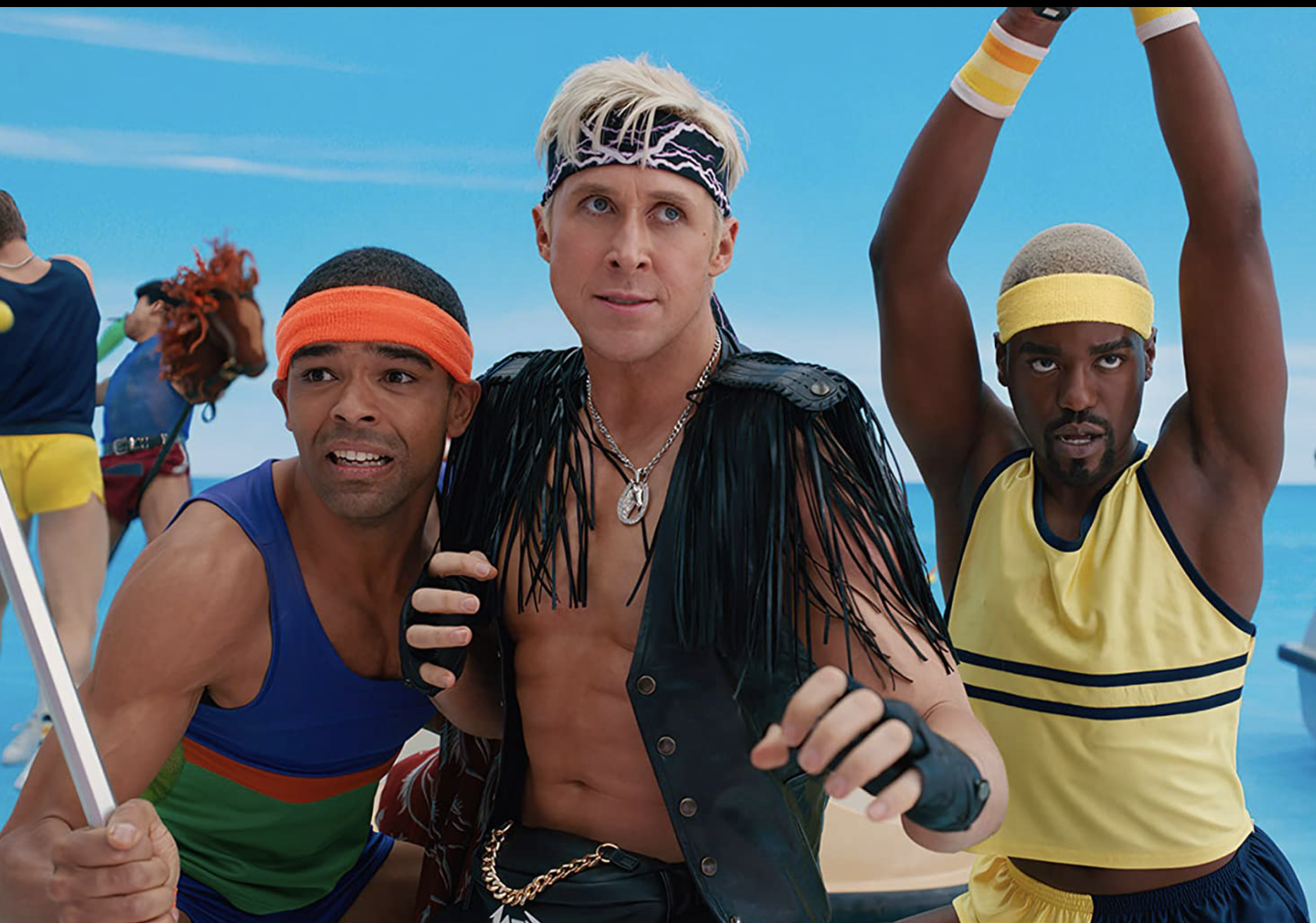
When patriarchal Kens fight
Brian Zahnd likes to say about the patriarchy, “There’s always some dude on a horse.” And when it comes to world history, these dudes tend to fight each other.
Kevin DeYoung writes in defense of male headship: “Patriarchy is inevitable” because of the “male irresponsibility that runs wild when women are forced to be in charge.” He asks rhetorically, “What school or church or city center or rural hamlet is better off when fathers no longer rule?” Thus, he concludes, “The choice is not between patriarchy and enlightened democracy, but between patriarchy and anarchy.”
One such inter-patriarchal civil war happened recently between TheoBros on Twitter who claimed men should control the books their wives read and other TheoBros who claimed they trusted their wives’ discernment. “Your wife is your first disciple,” one declared. “Why wouldn’t you be active in helping her cultivate the best reading list.” Regarding any husband who does not monitor his wife’s books, he judged, “This is husbandly dereliction.”
In the case of Kendomland: Land of the Free and the Men, the Kens also turn on one another. But rather than hurling tweets, they tossed beach toys at one another.
Insecurity about imperfections
Because patriarchal reality is a hierarchy, insecurity is built into the system by wielding power through degrees of perfection. While many women experience this shame due to not living up to patriarchy’s roles for motherhood, others feel shame due to not living up to the professional and beauty standards of Barbie.
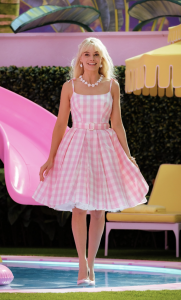 When Barbie begins lamenting her imperfections, the narrator interjects, “Note to film makers: Margot Robbie is not the right person to cast to make this point.”
When Barbie begins lamenting her imperfections, the narrator interjects, “Note to film makers: Margot Robbie is not the right person to cast to make this point.”
But Barbie feels she’s not good enough. One character tells her, “It kills me that you don’t think you’re good enough. Like, we have to always be extraordinary, but somehow we’re always doing it wrong.”
Barbie tells another character, “I usually look perfect,” while the person responds, “I don’t know. I think you’re just right.”
In one of the most beautiful scenes, Barbie sits on a bench next to an elderly woman and expresses through a tear, “You’re so beautiful.” The old woman responds, “I know it.”
Because popular Christian theology is framed as a hierarchy, its narrative is told as a story of a perfect God creating perfect humans in a perfect cosmos. Then the problems we experience are due to perfect humans behaving in imperfect ways and thus throwing the entire cosmos into imperfection until a perfect Savior comes in to live a perfect life and die as a perfect substitutionary sacrifice so we can be declared perfect once more and be welcomed by a perfect God who wrote a perfect Bible and requires perfection or imputed perfection in order to be in relationship. It’s a narrative ripe for insecurity.
“While perfection has more to do with our behavior, goodness has more to do with our being.”
But if we assume Genesis has relevant concepts about the human story, it never says God created us perfect. Instead, it says God created everything good and humanity very good. While perfection has more to do with our behavior, goodness has more to do with our being.
Being human
At the end of the movie, the plot turns toward discovering who we are. Even though we are inextricably intertwined relationships, we also have to discover who we are and what it means to be human.
In the case of the Kens, it begins with their confession that “It was hard running stuff. I didn’t love it,” or with Will Ferrell’s character yelling, “It’s just so hard to be a leader!”
Still, Ferrell’s character couldn’t help but remain in charge of women attempting to pitch their ideas for new Barbies. “I too can now relieve myself of this heavy existential burden while holding onto the very real title of CEO.”
It’s similar to the stories of “soft complementarians,” where some patriarchs are OK with women preaching as long as men retain the title of pastor.
Then Barbie has a face-to-face meeting with her creator.
“Being a human can be pretty uncomfortable,” her creator says. “Humans make things up like patriarchy and Barbie just to deal with how uncomfortable it is. And then you die.”
“By participating in the liberation of others, Barbie learns to recognize the games and roles we play to deal with the weight of life.”
By participating in the liberation of others, Barbie learns to recognize the games and roles we play to deal with the weight of life. It’s hard enough as embodied, evolved, interrelated humans to thrive in the world. But it’s even more difficult to do so under the weight of patriarchy’s towers.
But while patriarchy is obsessed with the roles men and women play, the universal oneness of the real world sees us in our deepest and most interrelated humanity.
Barbie’s creator tells her she didn’t create her to control her. Then Barbie asks, “So being human’s not something I need to ask for or, you know, want? It’s something I just discover that I am?”
Her creator then gently responds with: “Take my hands. Now close your eyes. Now feel.”
An unfinished, imperfect plot
Detractors of Barbie will mention some of the problems with the way Kens are treated by the Barbies or with the way the hierarchy is simply reversed rather than altogether abolished in exchange for a true mutuality. But for those who pay attention, it’s clear Gerwig has a longer process of transformation in mind beyond what is experienced in the movie.
“I want to do the imagining. I don’t want to be the idea.”
One character notes, “I don’t think that things should go back to the way that they were. No Barbie or Ken should be living in the shadows.” But because Barbieland and the real world are interconnected, they decide “the Kens have to start somewhere. And one day, the Kens will have as much power and influence in Barbieland as women have in the real world.”
And that’s where imagination comes in. Barbie tells her creator, “I want to be part of the people that make meaning, not the thing that’s made. I want to do the imagining. I don’t want to be the idea.”
Author Margaret Atwood puts it this way: “Oppression involves a failure of the imagination: the failure to imagine the full humanity of other human beings.”
To dismantle patriarchy’s oppression is to imagine the full humanity of self and others until all are present in love to join hands, close our eyes and feel.
Or as Ken would say, “I am kenough.”

Rick Pidcock
Rick Pidcock is a 2004 graduate of Bob Jones University, with a Bachelor of Arts degree in Bible. He’s a freelance writer based in South Carolina and a former Clemons Fellow with BNG. He recently completed a Master of Arts degree in worship from Northern Seminary. He is a stay-at-home father of five children and produces music under the artist name Provoke Wonder. Follow his blog at www.rickpidcock.com.
Related articles:
Can Barbie help us create justice? | Opinion by Val Fisk
Complementarianism may promote the death of the family | Analysis by Rick Pidcock


